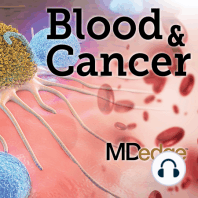21 min listen

How does COVID-19 affect patients with hematologic malignancies? The ASH registry provides some answers
FromBlood & Cancer
How does COVID-19 affect patients with hematologic malignancies? The ASH registry provides some answers
FromBlood & Cancer
ratings:
Length:
27 minutes
Released:
Dec 17, 2020
Format:
Podcast episode
Description
The ASH Research Collaborative COVID-19 Registry for Hematology was established earlier this year to study patients with hematologic malignancies diagnosed with COVID-19. Now, the registry also includes patients with nonmalignant hematologic disorders and hematologic manifestations of COVID-19. William Wood, MD, of the University of North Carolina at Chapel Hill, recently presented data from the registry at the ASH Annual Meeting. In this episode, Dr. Wood tells host David H. Henry, MD, how the registry came to be and reviews some of its findings. About the registry The registry is part of the ASH Research Collaborative, an organization established in 2018 to foster collaboration to accelerate progress in hematology. The registry houses data on patients with a COVID-19 diagnosis and hematologic disorders/malignancies or hematologic manifestations of COVID-19. Health care providers around the world can contribute data to the registry. Anyone can view summaries of the deidentified data on the registry website. The website data are updated every day or every few days. The information compiled in the registry includes: The nature of patients’ underlying disease Treatments received until COVID-19 diagnosis Sociodemographic information COVID-19 symptoms and time to resolution or death COVID-19–directed treatments Expected prognosis Whether patients opted for intensive care. Registry findings The registry data presented at ASH 2020 included 656 patients with hematologic malignancies and COVID-19. Dr. Wood said the first conclusion drawn from these data is that patients with underlying hematologic malignancies are a “medically vulnerable population” when it comes to COVID-19. The mortality rate was 20% overall and 33% in patients with hospitalization-level severity. The other major finding, Dr. Wood said, is that the risk of severe COVID-19 and death is differentially distributed. Risk factors for adverse COVID-19 outcomes include: Increasing age Advanced underlying disease or limited prognosis Forgoing intensive management. Relevant links ASH Research Collaborative: https://bit.ly/37pczyV. COVID-19 Registry for Hematology: https://bit.ly/3r1U9vO. Blood Adv. 2020. 4(23):5966-75. https://bit.ly/34jWVTt. Wood W et al. ASH 2020, Abstract 215. https://bit.ly/3gRzw0A. Disclosures Dr. Wood disclosed research funding from Pfizer, consultancy for Teladoc/Best Doctors, and honoraria from the ASH Research Collaborative. Dr. Henry has no relevant disclosures. * * * For more MDedge Podcasts, go to mdedge.com/podcasts Email the show: podcasts@mdedge.com Interact with us on Twitter: @MDedgehemonc David Henry on Twitter: @davidhenrymd
Released:
Dec 17, 2020
Format:
Podcast episode
Titles in the series (100)
When to refer for CAR T-cell therapy: Chimeric antigen receptor (CAR) T-cell therapy is one of the hottest advances in lymphoma treatment, but who should get it and what does the process look like? , of the Cleveland Clinic helps answer those questions on the podcast. She joins Blood... by Blood & Cancer